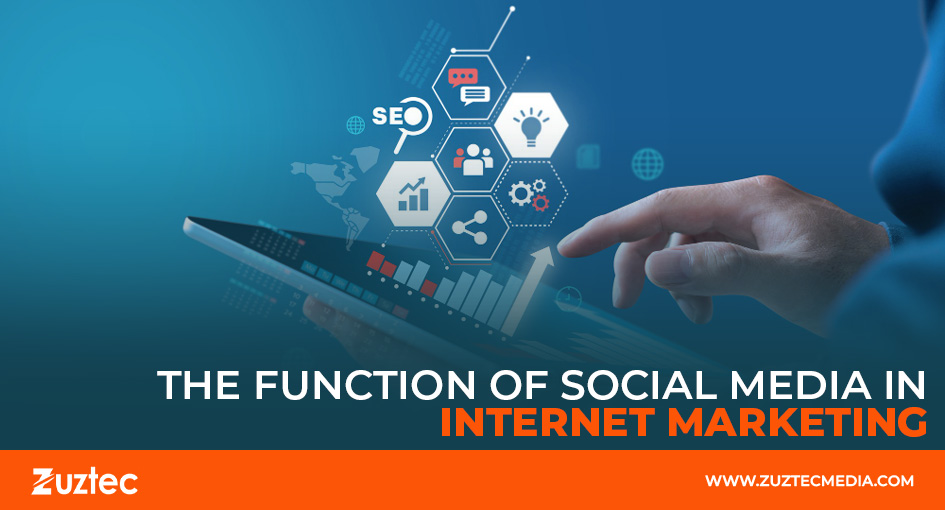
The Function of Social Media in Internet Marketing
In today’s digital landscape, internet marketing has evolved into a multi-faceted approach that incorporates various platforms and strategies to reach potential customers. One of the most influential elements of this modern marketing paradigm is social media. With billions of users actively engaging on platforms such as Facebook, Instagram, Twitter, and LinkedIn, businesses can leverage these networks to connect with their audience in ways that traditional marketing channels simply cannot match. The role of social media in internet marketing extends beyond just promoting products or services; it encompasses building brand awareness, fostering customer relationships, and driving engagement.
Social media allows businesses to create a dynamic online presence that resonates with their target audience. Through consistent interaction and tailored content, companies can cultivate a loyal community of followers who are more likely to convert into customers. Moreover, social media provides invaluable insights into customer preferences and behaviors, enabling businesses to refine their marketing strategies effectively. By utilizing targeted advertising and analytics tools, brands can maximize their reach and return on investment.
This article delves into the significant influence of social media on it, highlighting its benefits, strategies, and best practices for enhancing brand visibility and fostering customer engagement, making it crucial for businesses in the digital age.
Understanding Internet Marketing and Social Media’s Role
It refers to the strategies and tactics used to promote products and services through online channels. It encompasses various practices, including search engine optimization (SEO), email marketing, content marketing, and social media marketing. Social media, in this context, plays a vital role as it provides a platform for direct interaction between businesses and consumers.
Through social media, companies can create and share engaging content that resonates with their audience. This approach allows for two-way communication, where businesses can receive immediate feedback and adapt their strategies accordingly. Unlike traditional marketing methods, which often rely on one-way communication, social media encourages dialogue, helping brands to understand their customers’ needs better.
Building Brand Awareness and Engagement
Increasing brand recognition is one of the main advantages of utilizing social media for internet advertising. By sharing compelling content and participating in conversations, businesses can increase their visibility and reach a broader audience. Posts that resonate with users can go viral, significantly amplifying a brand’s exposure.
Moreover, social media fosters customer engagement, enabling businesses to connect with their audience on a personal level. This interaction can take various forms, such as comments, shares, and likes. Engaging with followers through comments and messages shows that a brand values customer opinions, building trust and loyalty over time.
To maximize engagement, brands can use techniques like polls, contests, and user-generated content campaigns. These strategies not only encourage participation but also help create a sense of community around the brand, further enhancing its appeal.
Targeted Advertising and Analytics
Another significant advantage of social media in internet marketing is the ability to run highly targeted advertising campaigns. Platforms like Facebook and Instagram offer sophisticated targeting options that allow businesses to reach specific demographics based on factors such as age, gender, location, interests, and online behaviors. By focusing marketing efforts on the most appropriate audience, this accuracy raises the probability of conversion.
Moreover, social media platforms provide valuable analytics tools that enable businesses to measure the effectiveness of their campaigns. Metrics such as engagement rates, click-through rates, and conversion rates offer insights into what works and what doesn’t. By analyzing this data, businesses can make informed decisions to refine their strategies, optimize their content, and allocate resources effectively.
Driving Traffic to Websites
Social media serves as a powerful driver of traffic to a company’s website. By sharing links to blog posts, product pages, or landing pages, businesses can encourage followers to visit their site for more information or to make a purchase. Integrating social media buttons on websites makes it easy for visitors to share content, further amplifying reach and driving more traffic.
Additionally, creating shareable content—such as infographics, videos, and articles—can enhance the likelihood of users sharing it within their networks. This not only boosts traffic but also positions the brand as an authority in its industry, ultimately improving its search engine ranking through increased visibility and backlinks.
Enhancing Customer Service and Support
Social media has revolutionized how businesses provide customer service. Instead of relying solely on email or phone support, companies can engage with customers in real time through social media channels. Addressing inquiries, complaints, and feedback promptly demonstrates a commitment to customer satisfaction, which can significantly enhance a brand’s reputation.
Businesses can use chatbots and automated responses to handle common questions or direct customers to relevant resources. This approach not only improves efficiency but also ensures that customers receive timely assistance, contributing to a positive overall experience.
In the end, the role of social media in internet marketing is indispensable in today’s digital landscape. It offers businesses unique opportunities to engage with their audience, enhance brand awareness, and drive traffic to their websites. Through targeted advertising and robust analytics, brands can create effective marketing strategies that resonate with their customers and foster loyalty.
As consumers increasingly rely on social media for information and recommendations, businesses must adapt to this evolving environment. By leveraging the power of social media, brands can cultivate meaningful relationships with their audience, leading to improved outcomes in their internet marketing efforts. In conclusion, the integration of social media into internet marketing strategies is essential for businesses looking to thrive in the competitive digital space, ensuring they remain relevant and connected to their customers’ needs.

